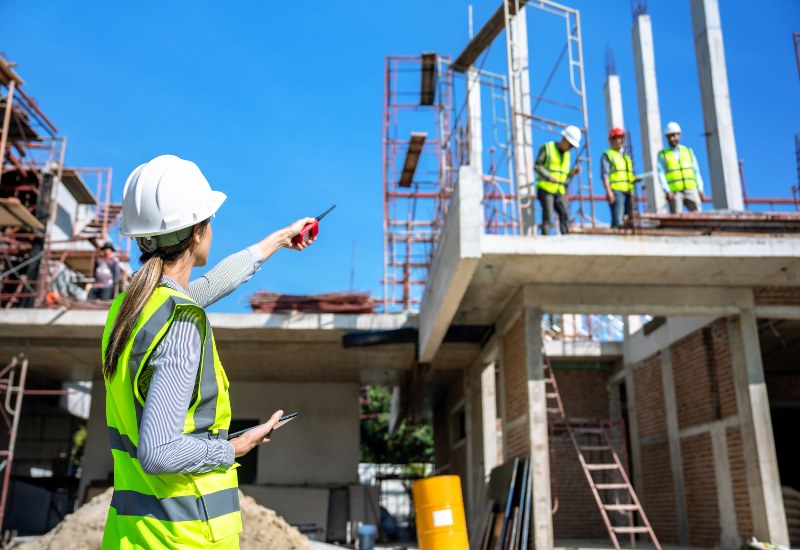How Current Pressures Are Affecting Construction

The construction industry is experiencing a number of pressures that are reshaping how commercial construction projects are planned, managed, and executed. Each of these pressures presents unique challenges and opportunities.
The construction industry is important for economic growth as well as infrastructure, but it faces a number of challenges that test its resilience. Supply chain disruptions have led to material shortages and increased costs, while regulatory changes have demanded new compliance efforts. Labor shortages further complicate project timelines and quality. In addition to these factors, the sustainability and energy efficiency considerations are changing industry standards and expectations. All of these challenges are complicated and construction companies need to develop strategies to deal with them in order to survive.
In this article, we’ll discuss some of the most serious challenges, the impact of each, and suggested strategies to overcome these issues.
Supply Chain Disruptions
- Challenge – The global supply chain for construction materials has become unsteady. Events like the COVID-19 pandemic, trade disputes, and natural disasters have led to shortages, delays, and price volatility for materials such as steel, lumber, and concrete.
- Impact – These disruptions increases costs and cause delays in project timelines, putting pressure on project managers to find alternative sources of materials and to adjust project schedules.
- Strategies – Companies can cop by diversifying their supplier networks, increasing stockpiles of critical materials, and exploring local sourcing options to lessen these risks.
Regulatory Changes
- Challenge – The construction industry is heavily regulated, and changes in building codes, environment regulations, and safety standards can have a serious impact on project planning and costs.
- Impact – Failing to comply with these regulations can lead to fines, project delays, or even job stoppages. Adapting to new regulations may require additional training, updated equipment, and even completely redesigning projects.
- Strategies – Being quick to adhere to regulatory changes and incorporating these changes into the early stages of project planning can help avoid these problems.
Labor Shortages
- Challenge – The industry faces a shortage of skilled labor due to an aging workforce, reduced interest in trade careers among younger generations, and gaps in vocational training.
- Impact – This shortage leads to increased labor costs, project delays, and can even compromise the quality of work.
- Strategies – Investing in workforce development programs, apprenticeships, and partnerships with educational institutions can help to alleviate this problem. In addition, improving working conditions and offering competitive compensation packages can help to attract and retain talent.
Sustainability and Energy Efficiency Trends
- Challenge – There’s an increasing demand for sustainable and energy-efficient building practices. This trend is driven by environmental concerns, regulatory pressures, and consumer preferences.
- Impact – Adapting to these trends often requires incorporating new technologies and materials, which can be more expensive initially, but offer long-term cost savings and environmental benefits.
- Strategies – Develop green building practices, invest in sustainable materials, and educate clients about the long-term benefits of sustainable construction.
Impact on the Construction Business
- Overview – The effect of these challenges leads to increased costs, more complex project management, and the need for careful planning and innovation.
- Adaptation – Companies must adopt a more flexible approach, utilizing advancements in technology for project management, managing resource allocation, and monitoring market trends.
Advanced Building Corporation’s Response to These Challenges
- Workforce Development – We are focusing on training and development to address the skilled labor shortage in order to maintain a more competent and efficient workforce.
- Supply Chain Resilience – ABC is enhancing supply change management strategies to lessen the risks of material shortages and delays.
- Sustainability Initiatives – By prioritizing sustainable practices and energy efficiency in projects, ABC is able to meet market demand and satisfy regulatory requirements.
Conclusion
While the pressures facing commercial construction companies are challenging, they can present opportunities for companies to innovate. The industry’s future will be characterized by adaptability, technological integration, and a strong focus on sustainability. The ability to adapt and change in response to these pressures will be a major factor in the success of any commercial construction company.
Advanced Building Corporation
For over 30 years, Advanced Building Corporation has served the South Central Wisconsin area, specializing in custom design and construction across a wide range of sectors, including industrial, warehouse, office, multi-family, CBRF, retail and recreation projects. Our comprehensive services take clients from pre-construction planning to project completion, ensuring on-time and on-budget delivery. As a skilled team providing exceptional service, we are more than builders; we act as consultants, aligning our work with your business objectives. We handle key tasks like demolition and steel erection in-house for optimal quality control. You’re invited to explore our portfolio and client testimonials to see the high standard of work we consistently deliver.
For more information about our company, visit our website or reach out to a member of our team at 608-218-5649.
